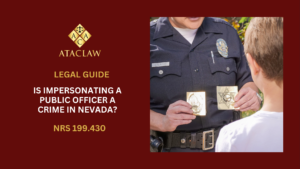Maintaining the integrity and trust in public officials, including law enforcement officers, military personnel, and judicial figures, is of paramount importance. As such, the Nevada Revised Statutes (NRS) specifically address and criminalize the act of impersonating these figures under NRS 199.430. This legislation not only highlights the state’s stance against such deceptive practices but also sets forth the legal framework for prosecuting individuals who attempt to undermine public trust in this manner. Whether driven by misguided intentions or for more nefarious purposes, impersonating a public officer is a serious offense that carries with it significant legal repercussions.

What Does It Mean to Illegally Impersonate an Officer in Nevada?
The crime of pretending to be a public official in Nevada is more complex than it might initially appear. Under the state’s legal framework, the crime known as impersonating an officer is defined not just by donning a uniform or displaying a badge, but by the intent to deceive or harm someone by falsely claiming to be:
- a public officer, in a civilian or military capacity, or
- a law enforcement officer, or
- a person with the legitimate authority to carry out an act that impacts another person’s rights or interests.
It is critical to note that conviction for the violation of NRS 199.430 doesn’t require the physical appropriation of official insignia associated with the officer’s role. Moreover, just wearing a costume that resembles an officer is not a transgression by the letter of the law; the decisive factor for illegality lies in the intention of the person dressed as such—to defraud or cause injury.
The legislative wording of Nevada’s statute takes into consideration the subtleties of such impersonation, which goes beyond mere appearance or attire. The essence of the crime is embedded in the act of deception—assuming the identity of a figure of authority to manipulate situations to one’s advantage, possibly at the expense of others’ rights and well-being.
What Are the Legal Consequences for Impersonating an Officer?
Conviction for officer impersonation can result in severe penalties, which may include:
- Up to 364 days in jail,
- Fines reaching a maximum of $2,000,
- Possible victim restitution ordered by the judge for recovery of damages incurred due to the impersonation.
These sanctions underscore the gravity of such an offense in the eyes of Nevada courts, emphasizing the need to deter such harmful behavior in society.
What Are the Potential Defense Strategies in Officer Impersonation Cases in Nevada?
Legal strategies to defend against officer impersonation accusations must be attuned to the unique circumstances surrounding each case. Three primary defenses typically considered are:
Crafting a Defense Against Impersonation Allegations:
In the state of Nevada, crafting a defense against allegations of falsely impersonating an officer hinges predominantly on the specifics of the individual case. The path to the most effective defense strategy varies accordingly. Here are some general tactics to counteract charges of falsely impersonating an officer:
Insufficient Evidence:
One critical element in any court case is proving the guilt of the defendant ‘beyond a reasonable doubt.’ Therefore, the defense attorney might work to demonstrate that the prosecutor’s evidence is inadequate or unreliable to justify a conviction. If the defense can successfully highlight significant loopholes in the prosecution’s argument, there’s a chance that the charges might be dismissed.
Wrongful Accusations:
Another possibility is that the defendant has been wrongfully accused of officer impersonation. This unjust allegation could stem from motivations of vengeance, rage, or a simple misunderstanding on the part of the accuser. In such cases, if the defense lawyer can convince the court that the allegations are unfounded, the defendant may not be held criminally responsible.
Law Enforcement Misconduct:
Cases may arise where law enforcement officers violate constitutional rights during their investigations, possibly through unlawful searches, seizures, or arrests. In such circumstances, the defense attorney can take the step of filing a motion to suppress evidence derived from these illicit actions. If convicted, this could lead to all such contested evidence being disregarded and, in some instances, the dismissal of the officer impersonation case altogether due to insufficient proof.
By recognizing these defense strategies, you can navigate legal proceedings related to officer impersonation more effectively. At ATAC LAW, we understand the uniqueness of each case and devise strategies accordingly to ensure that every defendant gets a fair trial.
For further legal assistance and to discuss your case with an expert, don’t hesitate to contact ATAC LAW.
